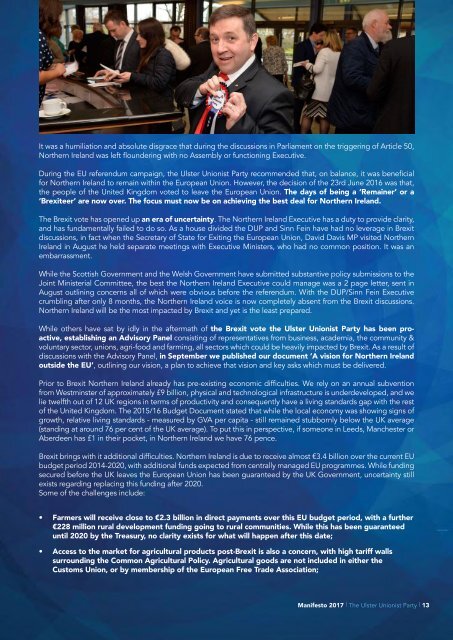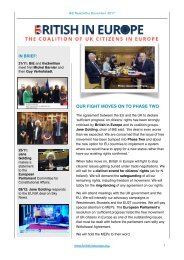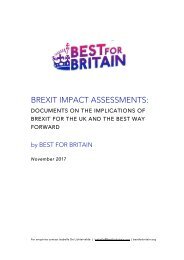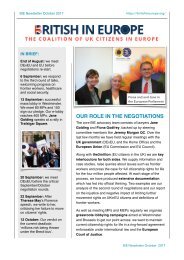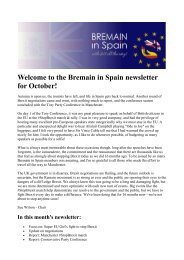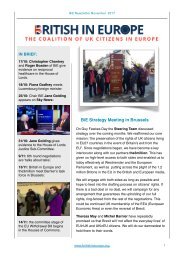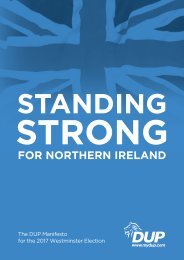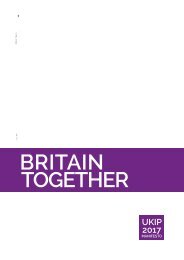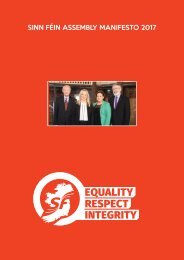You also want an ePaper? Increase the reach of your titles
YUMPU automatically turns print PDFs into web optimized ePapers that Google loves.
It was a humiliation and absolute disgrace that during the discussions in Parliament on the triggering of Article 50,<br />
Northern Ireland was left floundering with no Assembly or functioning Executive.<br />
During the EU referendum campaign, the <strong>Ulster</strong> Unionist Party recommended that, on balance, it was beneficial<br />
for Northern Ireland to remain within the European Union. However, the decision of the 23rd June 2016 was that,<br />
the people of the United Kingdom voted to leave the European Union. The days of being a ‘Remainer’ or a<br />
‘Brexiteer’ are now over. The focus must now be on achieving the best deal for Northern Ireland.<br />
The Brexit vote has opened up an era of uncertainty. The Northern Ireland Executive has a duty to provide clarity,<br />
and has fundamentally failed to do so. As a house divided the DUP and Sinn Fein have had no leverage in Brexit<br />
discussions, in fact when the Secretary of State for Exiting the European Union, David Davis MP visited Northern<br />
Ireland in August he held separate meetings with Executive Ministers, who had no common position. It was an<br />
embarrassment.<br />
While the Scottish Government and the Welsh Government have submitted substantive policy submissions to the<br />
Joint Ministerial Committee, the best the Northern Ireland Executive could manage was a 2 page letter, sent in<br />
August outlining concerns all of which were obvious before the referendum. With the DUP/Sinn Fein Executive<br />
crumbling after only 8 months, the Northern Ireland voice is now completely absent from the Brexit discussions.<br />
Northern Ireland will be the most impacted by Brexit and yet is the least prepared.<br />
While others have sat by idly in the aftermath of the Brexit vote the <strong>Ulster</strong> Unionist Party has been proactive,<br />
establishing an Advisory Panel consisting of representatives from business, academia, the community &<br />
voluntary sector, unions, agri-food and farming, all sectors which could be heavily impacted by Brexit. As a result of<br />
discussions with the Advisory Panel, in September we published our document ‘A vision for Northern Ireland<br />
outside the EU’, outlining our vision, a plan to achieve that vision and key asks which must be delivered.<br />
Prior to Brexit Northern Ireland already has pre-existing economic difficulties. We rely on an annual subvention<br />
from Westminster of approximately £9 billion, physical and technological infrastructure is underdeveloped, and we<br />
lie twelfth out of 12 UK regions in terms of productivity and consequently have a living standards gap with the rest<br />
of the United Kingdom. The 2015/16 Budget Document stated that while the local economy was showing signs of<br />
growth, relative living standards - measured by GVA per capita - still remained stubbornly below the UK average<br />
(standing at around 76 per cent of the UK average). To put this in perspective, if someone in Leeds, Manchester or<br />
Aberdeen has £1 in their pocket, in Northern Ireland we have 76 pence.<br />
Brexit brings with it additional difficulties. Northern Ireland is due to receive almost €3.4 billion over the current EU<br />
budget period 2014-2020, with additional funds expected from centrally managed EU programmes. While funding<br />
secured before the UK leaves the European Union has been guaranteed by the UK Government, uncertainty still<br />
exists regarding replacing this funding after 2020.<br />
Some of the challenges include:<br />
• Farmers will receive close to €2.3 billion in direct payments over this EU budget period, with a further<br />
€228 million rural development funding going to rural communities. While this has been guaranteed<br />
until 2020 by the Treasury, no clarity exists for what will happen after this date;<br />
• Access to the market for agricultural products post-Brexit is also a concern, with high tariff walls<br />
surrounding the Common Agricultural Policy. Agricultural goods are not included in either the<br />
Customs Union, or by membership of the European Free Trade Association;<br />
Manifesto 2017 | The <strong>Ulster</strong> Unionist Party | 13


